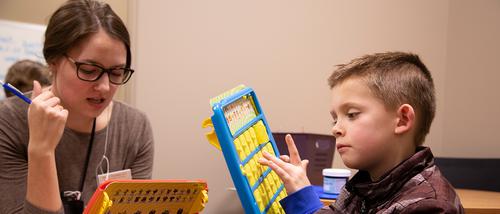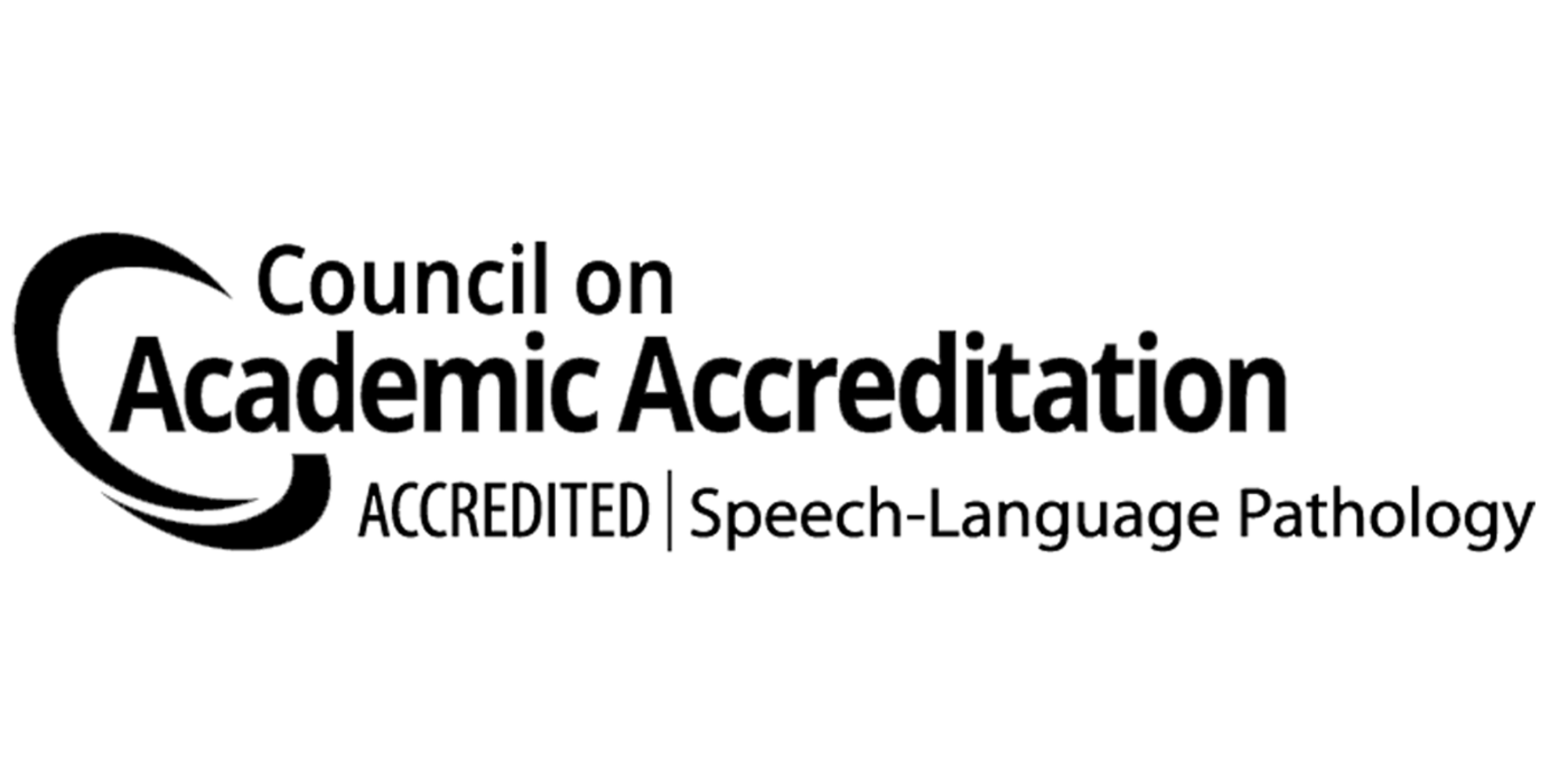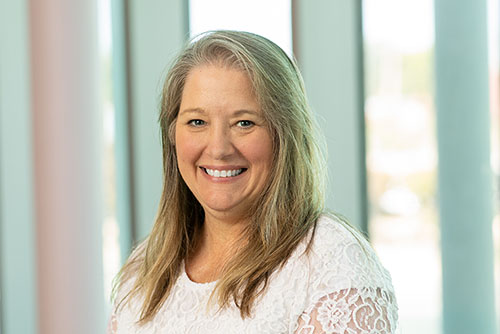Communication Disorders (MA)
Continue to main content
Masters in Communication Disorders Salaries & Outcomes
-
100%
Graduation outcomes
One hundred percent of students in the Communication Disorders program have successfully graduated from Southeast.
-
$95k
Speech-Language Pathologist
According to the Bureau of Labor Statistics, Speech-Language Pathologists (SLP) earn an average annual salary of $95,410.
-
18%
Growth Rate
The field of speech-language pathology is growing at a rate of 18%, much faster than average, according to the Bureau of Labor Statistics.
Master's in Communication Disorders Degree Map
Explore the courses you'll need to complete your master's in communication disorders degree.
- Admission is considered only for the summer semester. In addition to the criteria established for general admission to graduate studies, applicants must have the following:
- Hold an undergraduate degree in Communication Disorders (or equivalent area) from a regionally accredited college or university;
- OR: completed pre-requisite coursework via a post-baccalaureate leveling program
- Students who majored in another area who are interested in pursuing the M.A. in Communication Disorders but do not yet have the pre-requisite coursework can complete our flexible leveling program. This program can be completed online or in-person. The student should apply as an undergraduate student to participate in the leveling program, and then apply for the graduate program once leveling requirements have been completed.
- An undergraduate cumulative GPA of 3.0 or a minimum GPA of 3.0 during the last 2 years of undergraduate study during which at least 30 credit hours was earned
- Application completed in CSDCAS by January 15. As part of this process, you will be asked to submit:
- Academic transcripts from all prior institutions. Please see the CSDCAS website for instructions on how to submit official transcripts.
- Two letters of recommendation. Note: If more than 2 letters are submitted, priority will be given to letters submitted from instructors of communication disorders courses or supervisors of clinically relevant experiences.
- Resume
- Personal statement
- Birth certificate or driver's license
- Short, asynchronous virtual interview (if invited)
- This program does not require applicants to submit a GRE (Graduate Record Exam) score.
Students interested in applying for a graduate assistantship in Communication Disorders should submit the GA application form by January 15.
Step 1
Submit application and all supplemental documents through CSDCAS, designating Southeast Missouri State University as one of your institutions, by January 15.
If interested, also complete the graduate assistantship application for the Department of Communication Disorders by January 15.
Step 2 (International Students Only)
International applicants need to complete an application with Southeast Missouri State University. For this requirement, you should complete the Southeast Missouri State University online Application for Graduate Admission.
Important Note: This is a procedural step required by Southeast Missouri State University for international students in addition to the CSDCAS application. Applicants who have not completed this step by the application deadline will not be considered for admission.
Step 3
The admissions committee will invite students who submit complete applications by the January 15 deadline to participate in a short, asynchronous virtual interview. The committee will provide instructions for how to participate at that time.Step 4
Once the committee sends out the first round of decision letters, students will have until March 15 to respond. Note that this response deadline is different than that of programs that start in the fall, which have a response deadline of April 15. This change is because Southeast's program has a summer semester start (mid-June).
As responses come in, the committee will continue to send out decision letters on a rolling basis until all available spots in the cohort are filled. The program typically accepts between 20-22 students per cohort with 60% of spots reserved for Southeast graduates.
Need Assistance?
If you have questions concerning any aspect of the CSDCAS web application process, please contact CSDCAS via the methods described below:
- CSDCAS Applicant Help Center and Instructions
- CSDCAS Applicant Customer Service Desk, available Monday through Friday from 9 a.m. to 5 p.m. Eastern Time
- Phone: (617) 612-2030
- E-Mail: csdcasinfo@csdcas.org
If you have questions concerning the supplemental application to Southeast Missouri State University, please contact Graduate Admissions at (573) 651-2192 or graduatestudies@semo.edu.
If you have questions about admission to the graduate program in Communication Disorders at Southeast Missouri State University, contact Dr. Susan Fulton, Department Chairperson, or Amy Herren.
58 hours required
Required Courses:
- CD603 Advanced Communication Disorders Clinical Practicum (3 enrollments) (9)*
- CD608 Clinical Methods in Speech Language Pathology (2)
- CD616 Literacy Essentials for Speech Language Pathologists (3)
- CD620 Developmental Articulatory and Phonological Disorders (3)
- CD625 Research Methodology in Communication Disorders (3)
- CD628 Cognitive Communication Disorders and Their Functional Implications (2)
- CD630 Language and Disorders and Their Functional
Implications (3)
- CD634 Language and Cognitive Disorders in Early Childhood (2)
- CD635 Language, Cognitive and Social Communication Disorders in School-Aged Children (3)
- CD641 Voice Disorders (2)
- CD642 Stuttering and Cluttering (2)
- CD643 Augmentative, Alternative and Assistive Communication Modalities (2)
- CD651 Neurogenic Speech Disorders (2)
- CD652 Swallowing Disorders (3)
- CD653 Pediatric Feeding and Swallowing (1)
- CD656 Craniofacial Anomalies and Resonance Disorders (2)
- CD659 Speech and Language Services for Special Populations (2)
- CD669 Externship in Communication Disorders (2 enrollments) (6)
- CD670 Diversity, Equity, and Inclusion in Communication Disorders (2)
- CD685 Professionals Topics in Communication Disorders (2)
- Choose One of the Following Areas:
Non-Thesis Area
- CD683 Research in Communication Disorders (2 enrollments) (1-3)
- GR698 Master’s Final Comprehensive Examination (0)
Thesis Area
- CD695 Thesis (2 enrollments) (1-3)
- GR699 Master’s Oral Examination (0)
Additional requirements:**
- CD399 Speech and Hearing Science (3)
- CD525 Aural Rehabilitation (3)
**If the student did not have CD399 and/or CD525 or equivalent as an undergraduate, the student must take this course as a graduate student.
The degree requirements in Communication Disorders are designed to meet the academic and clinical standards established by the Council for Academic Accreditation (CAA) of the American Speech-Language-Hearing Association. Completion of the degree requirements constitutes one component toward the establishment of the student’s eligibility for the Certificate of Clinical Competence in Speech-Language Pathology (CCC-SLP).
It is the student’s responsibility to confer with his/her academic advisor regarding recent changes (if any) in academic or clinical standards. Also, it is the student’s responsibility to complete any additional requirements for the CCC-SLP beyond completion of the degree and to submit proper documentation of all required components.
Graduate Assistantships
The graduate assistantship (GA) is designed to provide support during full-time graduate study. It’s an opportunity for the graduate students to serve in a professional role while establishing a professional relationship with faculty and administrators. In addition to a per year stipend, GAs gain valuable experience. There are two kinds of assistantships: teaching and administrative.
Become a Redhawk.
Do more than dream about the future. Take the first steps to make it all happen.
What will it cost?
Clinical Practicum
Graduate majors in communication disorders are required to three semesters of on-campus clinical practicum prior to any externship experiences. One credit hour of this enrolled class consists of clinical seminars conducted via a weekly clinical meeting. These meetings cover important clinical and professional issues.
College of Education, Health and Human Studies
This degree is housed within the College of Education, Health and Human Studies. The college boasts programs that train students in mind, body, and soul. So, whether you want to teach, to care, to support, or to fix, we have a program to get you there.
Graduate Coordinators
Graduate coordinators serve as the contact for graduate programs. The coordinators are most often faculty within the college which houses the program, helping you to get questions answered and first-hand knowledge of the degree requirements and placement opportunities.
Getting the Job
Your education is just one piece to launching an extraordinary career. Once you’ve mastered the material, you still have to find the job you want, make the right connections, and sell your knowledge and experience—if all this is giving you anxiety, don’t panic. SEMO’s Career Services office is here to help you with the next step. Our boldly supportive faculty will provide the expertise and support you need, so you’re landing your dream job in no time.
One University Plaza, MS 2600
Cape Girardeau, MO 63701



